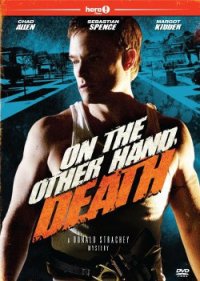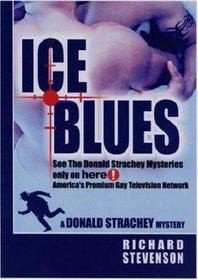Strachey's Folly - Stevenson Richard (книги онлайн полные версии бесплатно TXT) 📗
"I believe I have to turn the car in. And under the terms of the rental agreement, I'm the only person authorized to drive it." Suter smiled. "Just give Manuel the keys. It'll be fine." Suter pulled a roll of U.S. bills out of his pants pocket, peeled off four fifties, and handed them to Manuel.
"The keys are in the ignition," I said. "I guess I'm not the boss after all."
"Sure you are," Suter said, showing me his famous teeth— and cold sore.
Seconds later, a decrepit VW Bug, with one dented gray fender and one dented green one, pulled into the compound. The driver was a slender, tanned bleached blond in scruffy cutoffs. He had a tattoo of three intertwined nasturtiums on his left shoulder. He looked Californian, but Suter greeted the man in Spanish, which, when the blond replied, sounded like his native language.
I rode in the front seat with the driver and Suter slouched in the back, our bags upended on either side of him. After ten minutes of bumping and sliding up and clown a series of un-paved back roads north of town, we came to a simple wooden house on the seaside that appeared deserted. We quickly carried our bags around the house, where a small boat was beached. The blond unlocked the beachside door to the small house and soon carried out an outboard motor. After he had resecured the house, we shoved the boat into the water and the blond attached the motor to it. We climbed aboard with our bags. The blond got the motor going and soon we were headed north. "What's this from?" I asked Suter. "The Old Man and the
Sea? Kon-Tiki?"
He grinned and said, "It's a Carnival cruise, Strachey. Romance on the high seas. I'll be your Kathie Lee, if you'll let me."
The blond cracked a little smile. I said nothing until we rounded a palm-lined point, and there looming ahead of us, bobbing on the light swell, was a forty- or fifty-foot cabin cruiser.
"Oh, I see," I said. "That looks comfortable enough."
"It is," Suter said.
"Where are we headed? Key West? Miami?"
"No, we'll soon be on our way to La Coloma."
"Where's that? Florida?"
"Cuba."
All I could think to reply was "None of this would surprise Timothy Callahan."
Suter said, "It's simple. Nobody will be watching for us in Havana. From there we fly to Mexico City—there are several flights a day—and then on to Washington. A piece of cake."
"If you say so, Jim." I wondered again what Timmy would make of this twist out of Maclnnes or Ludlum, and what I should make of it.
Chapter 27
Now tell me the truth. The whole truth, if you're capable of it," I said to Suter.
We were stretched out on a couple of chaises under the stars on the foredeck of the cruiser, the Leona Vicario from Playa del Carmen, as it headed north-northeast across calm water. We had finished a light supper, as Suter had described it—a loaf of bread, two bottles of beer, and a rubbery object the youngest crewman had found in the sea, hacked up on a board with a machete, and sprinkled with lime juice. Suter had asked me how I thought the fresh conch was, and I said fair.
"I'm capable of telling the truth when it suits my interests," Suter said, "which it frequently does, and which it certainly does now. Most people in Washington would describe me as a truth-teller, in fact. Of course, when it doesn't suit my interests to tell the truth . . . well ... I guess you could say that that means I have some veracity issues to work on."
"That's how you might put it. I'd just say you're a liar."
"Not tonight." Suter waved his beer bottle at the magnificent starry vault above us. "How could anybody be anything but a truth-teller in the face of that?"
"Now there's a good line, Suter. A new one, too, for you."
He grinned.
"So where did you get the money that's in the suitcase? I saw you grab a gob of bills a while ago and pay off the captain of this boat. Is that suitcase you picked up in Playa stuffed entirely with U.S. currency?"
"Yes, it is." He smiled.
"Whose is it?"
"I'd say it's mine."
"Do the Ramoses say it's yours?"
He raised his bottle to the stars. "Fuck the Ramoses."
"Is it drug money?"
"Some of it."
"What's the rest of it?"
"The Ramoses' sources of income are wide-ranging."
"Uh-huh."
Suter added nothing more.
I said, "Won't they soon miss the money?"
"No."
"Why not?"
"Because it's cash Jorge has been skimming off the family operations over the past two years. He had it hidden under the roof of a house he owns in Playa. After I heard that Maynard had been shot and some of the Ramoses were out of control, I took the money and stashed it with some friends of mine in anticipation of what I am doing now—disappearing from the Ramoses radar screen. Jorge will have rushed back from Merida tonight after hearing that I'm gone. But he won't be able to tell his family that I took three point two million dollars' worth of their money, because then they could say, 'What money, Jorge?' The Ramoses will be scouring eastern Mexico for me, not because I've got their money—which they will never be told about—but because of what I know about them."
"Because, for instance, the Ramoses know that you know that they bought the NAFTA vote."
"You got it."
"These assholes actually changed modern history. Jesus, Suter."
He shrugged. "There's no need to be melodramatic about it, Strachey. NAFTA might have passed anyway. It was close."
"Oh, well, when you put it that way ..."
"It was a question of switching seventeen votes. Alan Mc-Chesney coordinated the campaign. I helped out, and so did a couple of other Hill people with Mexican-government business contacts and experience."
"Was the White House in on this?"
"Those clowns? Don't be silly."
"So the most historic piece of US. trade policy of the decade was made not by U.S. or Mexican elected officials, but by—who?"
Suter was staring at me now wide-eyed. "Are you really as naive as you sound?"
"No, I'm not. So who got what in return for their NAFTA votes?"
"The only outright buying of votes," Suter said conversationally, "was in the House. NAFTA pretty much sailed through the Senate. Of the seventeen House votes purchased, six were for vacation houses on the beach at Los Pajaros."
"Congressman Grandchamps, whom we saw on the beach on Wednesday, was one of those?"
"Right. Mexican law forbids outright ownership of beachfront property by foreigners, but there are easy ways around that. Banks hold the titles to property, and North Americans and other non-Mexicans buy long-term leases. So anybody planning on nailing the NAFTA vote-sellers need only follow the paper trail through the Mexican banking system."
"Okay. That's six."
"Another seven voters," Suter said, his curls fluttering in the warm breeze, "simply wanted campaign contributions that were laundered and untraceable. Vacation houses are nice, but for most House members reelection is what they anguish over night and day. They have to. It's how the system is set up. And overall, it works."
"It works for those who can afford to buy into it, yeah. So that's thirteen votes. Four to go."
"Three congressman wanted young women, and one wanted young men. There's nothing complicated about those motives, is there, Strachey?"




